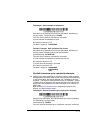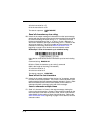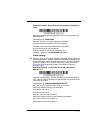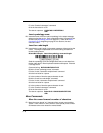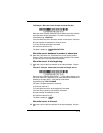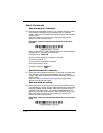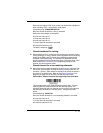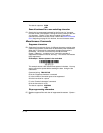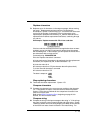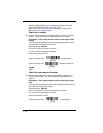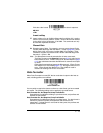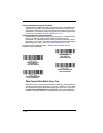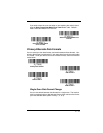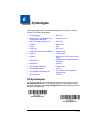
5 - 13
Replace characters
E4 Replaces up to 15 characters in the output message, without moving
the cursor. Replacement continues until the E5 command is
encountered.
Syntax = E4nnxx
1
xx
2
yy
1
yy
2
...zz
1
zz
2
where nn is the total
count of of the number of characters in the list (characters to be
replaced plus replacement characters); xx
1
defines characters to be
replaced and xx
2
defines replacement characters, continuing through
zz
1
and zz
2
.
E4 Example: Replace zeroes with CRs in bar code data
If the bar code has characters that the host application does not want
included, you can use the E4 command to replace those characters
with something else. In this example, you will replace the zeroes in the
bar code above with carriage returns.
Command string: E402300DF10D
E4 is the “Replace characters” command
02 is the total count of characters to be replaced, plus the replacement
characters (0 is replaced by CR, so total characters = 2)
30 is the hex value for 0
0D is the hex value for a CR (the character that will replace the 0)
F1 is the “Send all characters” command
0D is the hex value for a CR
The data is output as: 1234
5678
ABC
<CR>
Stop replacing characters
E5 Terminates character replacement.
Syntax = E5.
Compare characters
FE Compare the character in the current cursor position to the character
“xx.” If characters are equal, move the cursor forward one position.
Syntax = FExx
where xx stands for the comparison character’s hex
value for its ASCII code.
Refer to the ASCII Conversion Chart, beginning on page A-3 for
decimal, hex and character codes.
Compare string
B2 Compare the string in the input message to the string “s.” If the strings
are equal, move the cursor forward past the end of the string. Syntax
= B2nnnnS where nnnn is the string length (up to 9999), and S consists
of the ASCII hex value of each character in the match string. For



